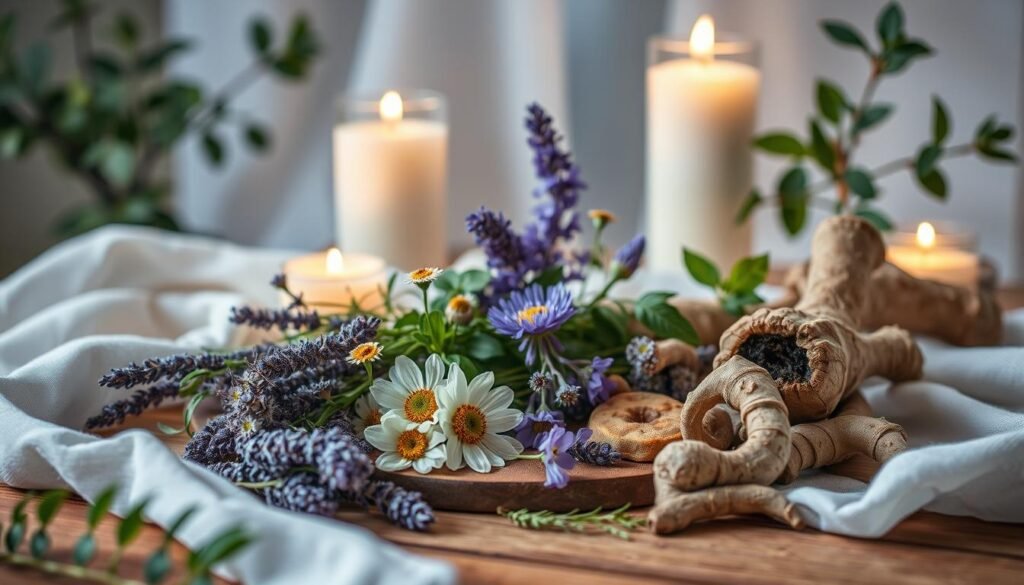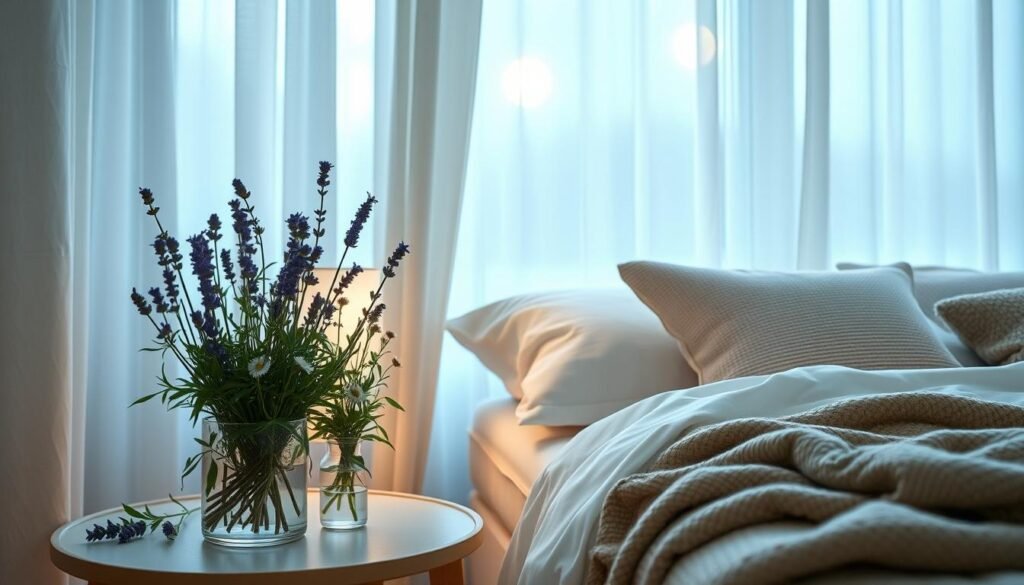
Herbal Sleep Remedies: Unlock Better Sleep Naturally
Are you tired of using traditional sleep aids and looking for a natural way to sleep better? Natural remedies like ashwagandha, chamomile, and valerian root can help improve your sleep quality1. These herbal sleep remedies offer a natural way to tackle sleep problems, avoiding the side effects and addiction of conventional aids. Almost 50% of Americans feel tired during the day2, showing the need for good sleep solutions.
Valerian root and chamomile are known for their calming effects and help you fall asleep faster3. They are among the most popular herbal sleep remedies.
Key Takeaways
- Herbal sleep remedies, including ashwagandha and valerian root, can improve sleep quality1.
- Natural sleep aids, such as chamomile tea, can reduce sleep latency and promote relaxation3.
- Herbal insomnia remedies, like passionflower extract, can help individuals fall asleep sooner and for longer1.
- Lavender has been found to improve sleep quality based on a controlled trial from 20152.
- Ashwagandha has adaptogenic effects, reducing stress and improving sleep architecture3.
Understanding Sleep Disorders and Their Causes
Sleep disorders affect many people, with over 80 types identified. These include insomnia, sleep apnea, and restless leg syndrome4. They can make daily life hard, affecting focus and overall health. Things like caffeine, alcohol, and work schedules can cause sleep problems4.
Some key factors that lead to sleep issues are:
- Lifestyle choices, like drinking caffeine and alcohol before bed
- Medical conditions, such as heart disease, lung disease, and diabetes5
- Mental health conditions, like stress, depression, and anxiety5
Using best herbs for sleep and sleep-enhancing herbs can help relax and improve sleep. For example, chamomile is known for its calming effects5. Natural remedies like herbal sleep aids can help improve sleep and health.
It’s important to tackle sleep disorders. Untreated, they can increase the risk of heart disease, stroke, diabetes, and mental health issues5. By choosing wisely and using best herbs for sleep, we can lower our risk of sleep disorders and boost our well-being.
| Sleep Disorder | Description |
|---|---|
| Insomnia | Difficulty falling asleep or staying asleep |
| Sleep Apnea | Pauses in breathing during sleep |
| Restless Leg Syndrome | Uncomfortable sensations in the legs during sleep |
The Science Behind Herbal Sleep Remedies
Herbal remedies for better sleep have been studied for their ability to help regulate sleep patterns and promote relaxation6. Scientists have looked into the chemical components of natural products to create drugs that can enhance sleep duration and quality6. It’s important to use organic sleep supplements to ensure they are safe and effective.
Herbs like valerian and hops have been found to improve sleep quality and reduce symptoms of insomnia7. A study of 16 randomized controlled trials found that valerian improved sleep quality over placebo7. Also, combining valerian and hops has been shown to enhance sleep quality and reduce the time it takes to fall asleep in people with insomnia7.
When picking herbal remedies for sleep, it’s key to think about how they might interact with other medicines. Using organic sleep supplements is also vital. By grasping the science behind herbal sleep remedies, people can make better choices for their sleep health.
| Herbal Remedy | Benefits |
|---|---|
| Valerian | Improves sleep quality, reduces insomnia symptoms |
| Hops | Traditionally used as a sedative and hypnotic agent |
Popular Herbal Sleep Remedies
Herbal sleep remedies have been around for centuries. They help with relaxation and better sleep. Holistic sleep solutions, like herbal sleep pills, are natural and effective. Over 60 million Americans have poor sleep quality, which can lead to serious health issues8.
Herbs like chamomile and valerian root are great for sleep. They can be part of a good sleep routine.
Some popular herbal sleep remedies include:
- Chamomile: known for its calming effects and ability to reduce anxiety
- Valerian root: a natural sedative that can help improve sleep quality
- Lavender: an aromatic herb that can promote relaxation and reduce stress
These herbal sleep remedies come in teas, capsules, or tinctures. They can be used with other holistic sleep solutions for better sleep. Valerian root is a top choice in the U.S. and Europe for sleep9.
Adding herbal sleep remedies to your routine can be safe and effective. Taking up to 30 grams of glycine daily is safe10. Always talk to a healthcare professional before trying new herbal remedies, if you’re on medications or have health issues. Herbal sleep remedies can help improve sleep and well-being when used with other holistic solutions.
Learn more about herbal sleep remediesand how they can be used to promote relaxation and improve sleep quality.
How to Use Herbal Remedies Safely
Using sleep-promoting herbs and natural sleep aids safely is key. About 40% of people use these remedies for sleep issues11. Always talk to a healthcare professional, if you have health problems or take medicines.
Knowing the right dosage is important. For example, 0.1 to 0.3 milligrams of melatonin works for many12. Also, a 200 mg Chamomile extract capsule daily for 28 days can help the elderly sleep better13. Be careful of interactions with other medicines, as Kava can cause serious liver issues11.
Here are some tips for safe use:
- Consult with healthcare professionals before starting any new supplement
- Follow recommended dosages and guidelines
- Be aware of possible interactions with other medicines
- Watch how your body reacts and adjust as needed

By following these tips, you can use sleep-promoting herbs and natural sleep aids safely. This way, you can improve your sleep quality.
| Herbal Remedy | Recommended Dosage | Potential Benefits |
|---|---|---|
| Chamomile | 200 mg extract capsule daily | Improves sleep quality in the elderly |
| Melatonin | 0.1 to 0.3 milligrams daily | Decreases time to fall asleep and increases feelings of sleepiness |
| Valerian | 400-900 mg extract up to 2 hours before bedtime | Helps with insomnia and improves sleep quality |
Incorporating Herbal Remedies into Your Routine
Using herbal insomnia remedies requires careful timing and preparation. Making a cup of tea can be calming and help you sleep14. This is because the act of making tea can be a mindful experience, helping your mind relax.
To make the most of best herbs for sleep, combine them with good sleep habits. This means keeping a regular sleep schedule, having a calming bedtime routine, and making your sleep space comfortable14. Herbs like chamomile, valerian root, and lavender can be great for sleep. You can drink them as teas or take them as supplements.
If you’re new to herbal remedies, start with small amounts and increase as needed. Always talk to a healthcare professional before trying new supplements, even more so if you have health issues. For more on herbal remedies and sleep tips, check out healthyshopperplacer.com.
- Chamomile tea, which contains apigenin, promoting sleepiness and reducing insomnia symptoms14
- Valerian root tea, which has sedative properties beneficial for improving sleep quality14
- Lavender tea, which is known for its calming effects, aiding in relaxation before bedtime14
Creating a Relaxing Sleeping Environment
To get better sleep, it’s key to make your sleep space right. Use herbal sleep remedies and natural sleep aids to do this. A quiet, dark, and cool place is best to sleep well15.
Make your sleep area quiet, cool, and dark. This means less noise, the right temperature, and soft lights. These help you relax and sleep better.
Here are some ways to make your sleep area better:
- Turn off screens before bed
- Use soft lights in your bedroom
- Keep your bedroom free from distractions, like turning off devices
By following these tips and using herbal sleep remedies, you can sleep better. You’ll wake up feeling good. For more sleep tips, check outthis resource16.

Also, try relaxation methods like deep breathing and muscle relaxation. They help you relax and sleep better15. Mix these with herbal sleep remedies for the best sleep.
| Relaxation Technique | Description |
|---|---|
| Deep Breathing | Slow, deep breaths to activate the body’s natural relaxation response |
| Progressive Muscle Relaxation | Sequentially tensing and relaxing different muscle groups for relaxation |
Use these methods and tips before bed. They help you sleep well and wake up feeling refreshed. Herbal sleep remedies and natural sleep aids make a big difference17.
Lifestyle Changes to Complement Herbal Remedies
Improving sleep quality requires a holistic approach. This includes lifestyle changes and using sleep-enhancing herbs. Eating a balanced diet and avoiding heavy meals before bed helps regulate sleep18. Also, regular exercise can improve sleep, with activities like tai chi and yoga being beneficial18.
Avoiding foods that disrupt sleep, like those high in sugar and fats, is key. Instead, eat more fruits, vegetables, and whole grains. Drinking plenty of water also helps improve sleep quality.
Exercise is vital for better sleep. It reduces stress and anxiety, making it easier to fall and stay asleep. Aim for 30 minutes of moderate exercise daily. But, avoid intense workouts close to bedtime, as they can disrupt sleep19.
By making these lifestyle changes, you can enhance your sleep environment. Always talk to a healthcare professional before starting new herbal remedies or making big lifestyle changes18.
| Lifestyle Change | Benefits for Sleep |
|---|---|
| Regular Exercise | Deepens sleep for young adults, improves sleep for older adults |
| Balanced Diet | Regulates sleep patterns, avoids disrupting sleep |
| Staying Hydrated | Contributes to improved sleep quality |
The Benefits of Integrating Herbal Remedies
Adding herbal remedies to your sleep routine can greatly improve your sleep. They can make your sleep better and cut down on the need for sleep medicines. Herbs like chamomile and valerian root help you relax and sleep better20. Organic sleep supplements are also safer than regular sleep drugs, with fewer side effects and less chance of addiction21.
Some of the key benefits of herbal remedies for sleep include:
- Improved sleep quality: Herbal remedies can help regulate sleep patterns and improve the quality of sleep20.
- Reduced dependence on pharmaceuticals: Herbal remedies can be a safer alternative to traditional sleep medications, reducing the risk of dependency and adverse events21.
- Enhanced overall health: Herbal remedies can have a positive impact on overall health and well-being, reducing stress and anxiety and promoting relaxation20.
It’s important to remember that herbal remedies should be part of a healthy sleep routine. This means keeping a regular sleep schedule, making your sleep area calm, and avoiding exciting activities before bed. By mixing herbal remedies with good sleep habits, you can sleep better and use less sleep medicine21.
Potential Side Effects of Herbal Sleep Remedies
Using herbal sleep pills or sleep-promoting herbs comes with some risks. About 8 out of 10 people feel a hangover the next day after taking sleep medicine22. Also, antihistamines used as sleep aids can be dangerous, mainly for kids, and aren’t meant for sleep22.
Some herbal sleep remedies might not get along with other medicines. This could include blood thinners and diabetes meds, leading to bad reactions22. Always talk to a doctor before trying herbal sleep pills or sleep-promoting herbs, if you have health issues or take other meds. For instance, valerian can help you fall asleep faster and sleep better, but it might cause headaches, dizziness, or stomach problems23.
To stay safe, always use the right amount and check with a doctor first. For more details on safe use and possible side effects, visit herbal sleep remedies and talk to a healthcare provider. Knowing the risks and taking the right steps can help you use herbal sleep pills and sleep-promoting herbs safely to get better sleep.
Comparing Herbal Remedies to Over-the-Counter Options
Many people use over-the-counter (OTC) sleep aids to help with sleep issues. But, natural sleep aids and herbal insomnia remedies are gaining popularity. They offer benefits and have fewer side effects24. shows that 35% of adults in America don’t get enough sleep, and 8% use sleep aids often.
Herbal insomnia remedies are seen as a safer and cheaper choice. The CDC found that 15% of adults in America have insomnia25. These natural aids are affordable and easy to find, making them a good option for many.
Some well-known herbal insomnia remedies include:
- Magnesium
- Valerian Root
- L-Theanine
- Chamomile
These natural aids help with sleep and are often mixed with other herbs for better results25.

In summary, herbal insomnia remedies and natural sleep aids are good alternatives to OTC sleep aids. They are safer and more affordable for those with sleep problems2425.
| Remedy | Effectiveness | Cost |
|---|---|---|
| Herbal Insomnia Remedies | High | Low |
| OTC Sleep Aids | Moderate | High |
Frequently Asked Questions About Herbal Sleep Remedies
Herbal sleep remedies are a popular choice for those seeking a natural solution to their sleep problems. Many people have questions about the effectiveness and safety of these remedies.
One common question is how long it takes for herbs to work. The answer to this question can vary depending on the individual and the specific herbal remedy being used26. Some herbal sleep remedies, such as valerian supplements, may take a few weeks to start working, while others, like melatonin supplements, may have a more immediate effect26.
Another question people often have is whether herbal remedies are safe for everyone. While herbal sleep remedies are generally considered safe, they may not be suitable for certain groups, such as pregnant or breastfeeding women, or individuals with certain health conditions27. It is essential to consult with a healthcare professional before using any herbal sleep remedy, as they may interact with other medications26.
Common Questions About Herbal Sleep Remedies
- Are herbal sleep remedies effective for insomnia?
- Can herbal sleep remedies interact with other medications?
- Are herbal sleep remedies safe for long-term use?
Herbal sleep remedies, including sleep-enhancing herbs, can be a useful tool for improving sleep quality. It is important to use them responsibly and under the guidance of a healthcare professional. By doing so, individuals can harness the benefits of herbal sleep remedies while minimizing the risks27.
| Herbal Remedy | Effectiveness | Safety |
|---|---|---|
| Valerian supplements | May take a few weeks to start working | Generally considered safe, but may interact with other medications26 |
| Melatonin supplements | May have a more immediate effect | Generally considered safe, but may cause side effects like headaches and nausea26 |
Cultural Perspectives on Herbal Sleep Practices
Cultural differences shape sleep practices and herbal remedy use. For centuries, herbs have helped people relax and sleep better. For example, chamomile is known for its calming effects in many cultures28.
Studies show sleep varies by culture. In Japan, people sleep less than in Western countries. They average about 5 hours and 59 minutes of sleep29. This shows the need for herbal sleep aids that fit different cultures.
Today, more people want natural sleep solutions. They’re looking for alternatives to medicines. This interest boosts demand for herbal sleep remedies and holistic sleep solutions30.
| Culture | Herbal Sleep Remedy | Traditional Use |
|---|---|---|
| Japanese | Chamomile | Calming effects |
| European | Valerian root | Sedative properties |

Research and Evidence Supporting Herbal Sleep Remedies
Studies have shown that herbal remedies can help improve sleep quality31. Supplements like valerian and lavender reduce how long it takes to fall asleep. They also make sleep feel better, both to the person and to doctors31. These herbs work by affecting brain chemicals, like GABA, to help relax and sleep better31.
Other herbs, like passionflower and lemon balm, have also been studied. They help lower anxiety and make it easier to fall asleep10. Melatonin supplements have been found to help regulate sleep patterns and improve sleep quality10. Always talk to a doctor before trying herbal remedies to make sure they’re safe and work well for you32.
Research suggests that valerian can be taken in doses of 300 to 600 milligrams before bed to enhance sleep10. L-Theanine, up to 200 mg a day, is safe and can help relax and reduce stress10. Adding herbal remedies and organic sleep supplements to your routine might improve your sleep and health31.
Finding Quality Herbal Products
When looking for herbal sleep remedies, it’s key to find safe and effective products. Look for certifications like USDA Organic or Non-GMO Project Verified. These ensure the product meets high standards9. It’s also important to understand the labels and ingredients to avoid allergens or drug interactions33.
A quality herbal sleep remedy should have natural ingredients that help you relax and sleep better. Valerian root, lavender, and chamomile are known to improve sleep34. When picking a product, consider these factors:
- Certifications from trusted organizations
- Clear labeling of ingredients and possible allergens
- Advice from healthcare professionals or trusted sources
By carefully choosing a high-quality herbal sleep remedy, you can get better sleep. This means waking up feeling refreshed9. Always follow the recommended dosage and talk to a healthcare professional if you have concerns33.
Future Trends in Herbal Sleep Remedies
The market for sleep-promoting herbs and holistic sleep solutions is growing fast. This is because more people want natural health products35. In China, there’s been a 38.3% increase in online sales of sleep-aiding health foods and supplements in the past year36.
People are now more aware of how sleep affects their health. They’re looking for new and effective ways to get better sleep. Herbal remedies like valerian root and chamomile are becoming popular. They offer a natural way to relax and improve sleep quality37.
There’s a trend towards using wearable devices to track sleep. Over a third of US consumers are interested in this36. Also, many Germans believe there’s a connection between gut health and sleep, with almost half agreeing36.
As the market keeps growing, we’ll see more new products. These will mix sleep-promoting herbs with holistic sleep solutions. With the sleep aids market expected to grow by 5.98% from 2024 to 2030, it’s clear people want natural ways to sleep better35.
Conclusion: A Holistic Approach to Better Sleep
Getting good sleep is more than just one thing. It’s about finding the right mix of lifestyle, environment, and natural remedies like herbal sleep supplements. By taking a holistic view, you can make the most of herbal sleep remedies. This helps you create a sleep routine that fits your needs perfectly.
Setting a regular bedtime routine and making your sleep space calm are key. It’s about using different methods to improve your overall health and balance. Remember, finding better sleep is a personal journey. It’s about trying new things and seeing what works for you.
Using calming herbs like lavender, chamomile, or valerian can help. Or, you might find other natural ways to sleep better. The goal is to wake up feeling great. With a holistic approach and an open mind, you can improve your sleep and health.
FAQ
How long does it take for herbal remedies to work for sleep?
Are herbal sleep remedies safe for everyone?
How do I find quality herbal sleep products?
What are some common types of sleep disorders?
How can herbal remedies help with sleep issues?
How do I incorporate herbal remedies into my sleep routine?
Source Links
- Unlocking Restful Nights: The Role of Natural Sleep Aids — Philadelphia Integrative Psychiatry
- Herbal Sleep Remedies: Plant-Based Sleep Aids for a Calm and Restful Sleep
- EMAN RESEARCH PUBLISHING |Most Read Abstract|Herbs for Better Sleep: A Natural Guide to Improving Sleep Quality and Overcoming Insomnia with Herbal Remedies
- Sleep Disorders | MedlinePlus
- Sleep disorders – Symptoms and causes
- Sleep-Aids Derived from Natural Products
- Herbal and Natural Supplements for Improving Sleep: A Literature Review
- Natural Sleep Aids: Home Remedies to Help You Sleep
- Natural Sleep Aids to Help You Get More Zzz’s
- Natural Sleep Aids: Which Are the Most Effective?
- Herbal Remedies and Sleep
- Natural Sleep Aids and Remedies
- VA.gov | Veterans Affairs
- Natural sleep aids home remedies to help you sleep
- Relaxation Exercises To Help Fall Asleep
- Sleeping Pills and Natural Sleep Aids – HelpGuide.org
- 10 Herbs for Sleep and Sleep-Related Struggles | Zzzquil
- Alternative Treatments for Insomnia
- Herbs for sleep: Examples, safety, other natural options, and more
- Herbal Remedies in Mental Health Care – Moriah Behavioral Health
- Herbal Remedies and Their Possible Effect on the GABAergic System and Sleep
- Are Sleeping Pills Safe?
- Valerian for insomnia? Maybe
- Compare Sleep Aids
- Best Sleep Aids: Prescription vs. Over-the-Counter
- Your guide to nonprescription sleep aids
- Frequently Asked Questions About Sleep
- Racial/ethnic disparities in sleep health and health care: importance of the sociocultural context
- Considering cross-cultural differences in sleep duration between Japanese and Canadian university students
- Herbal Remedies and Their Possible Effect on the GABAergic System and Sleep
- Herbal Remedies and Their Possible Effect on the GABAergic System and Sleep – PubMed
- Sleep: How it works and herbs to support it | Stress and sleep | Herbal Reality
- 9 Natural Sleep Aids to Get Better Sleep
- Natural Sleep Remedies
- Sleep Aids Market Forecast to Cross $89 Billion by 2030: Trends and Projections by Product, Sleep-Disorder and Distribution Channel at a Global, Regional and Country-Level
- Global Sleep Industry Trends: The Shift to Sleep Health
- ‘Bed rotting’ tops TikTok trends






